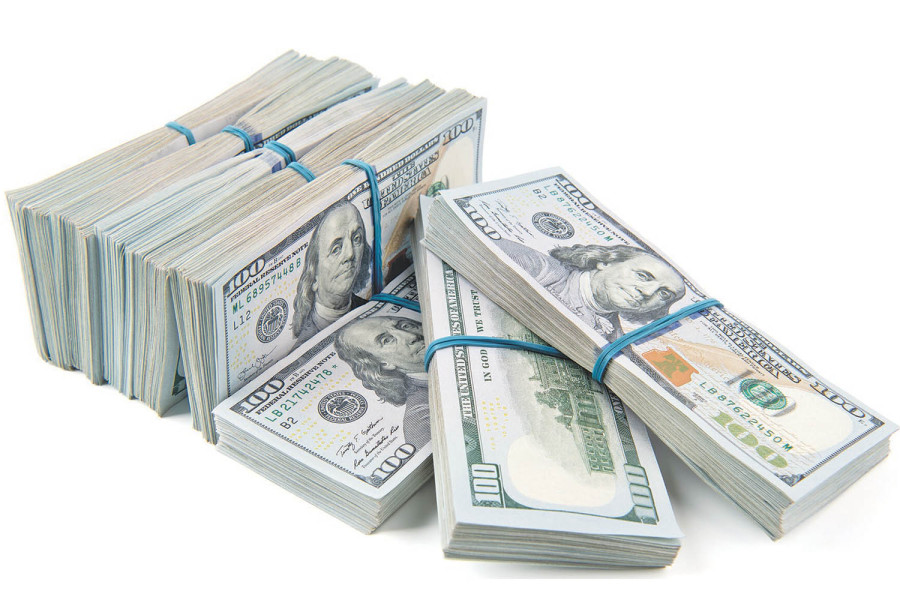Money
Awash with foreign cash, Nepal’s central bank relaxes exchange rules
The central bank has allowed Nepali travelling abroad to carry $2,500 per trip. Earlier, it was $2,500 twice a year.
Krishana Prasain
Nepal has eased the foreign exchange facility for Nepali travellers, traders, and those with dollar accounts as the central bank is awash with foreign currencies, with a historic high of reserves.
As of mid-June, the 11th month of the last fiscal year, the country had Rs1.96 trillion in foreign exchange reserves. The Nepal Rastra Bank’s own stock amounts to Rs1.75 trillion.
The central bank said on Thursday that it amended the unified directives to allow Nepali citizens travelling abroad to carry $2,500 per trip. Earlier, Nepali citizens were allowed $2,500 twice a year.
“Two years ago, we set the limitation on foreign exchange facilities in view of the country’s depleting foreign exchange reserves. Now we have amended the unified guidelines and removed the frequency limit as resources have improved. It will be helpful for frequent travellers,” said Ramu Paudel, spokesperson for the central bank.
However, the limit of the amount of currency available remains unchanged.
The amendments are based on the central bank's recently announced monetary policy for the current fiscal year.
Similarly, the central bank has doubled the foreign currencies available to Nepali citizens travelling to Tibet, China, and the SAARC countries.
Nepali citizens travelling to Tibet via surface route can now get an exchange facility of $1,000 one time and $2,000 in a fiscal year. This will also apply to Nepalis travelling to the SAARC countries, excluding India, via surface route.
This provision, however, will not apply to the residents of border regions who make frequent travels to Tibet.
The country’s foreign currency stock has been breaking records in recent months, mainly due to a robust remittance growth and ever-increasing migrant departures to foreign lands in search of better incomes.
Economists say that robust forex reserves suggest a scenario of low investments, particularly in a least developed country like Nepal.
In June 2022, Nepal’s foreign exchange reserves slid to a critical level that could sustain imports of goods for less than six months. Even the central bank's import controls did not improve the situation.
Instead, the measures nearly suffocated Nepal’s economy, according to the International Monetary Fund.
Following the Russia-Ukraine war, which choked the global supply system and caused prices to rise like never before, Nepal, too, suffered chronic current account deficits and was increasingly vulnerable to external economic shocks, while forex reserves dwindled fast.
In late April 2022, the government banned imports of at least 10 goods considered luxury or non-essential in a bid to stop the country’s foreign exchange reserves from depleting further. The ban was lifted in December 2022.
Paudel said that the foreign exchange ceiling has gone higher not only due to the improving forex reserve situation but also to prevent the hassles that travellers and traders are facing.
People who travel frequently despite the limited forex convertibility were facing the problem of submitting documents required by the central bank, he said. “The amended provision will help such travellers.”
The central bank has also amended the foreign exchange limitation for traders.
According to the amended provision, traders who import goods through demand draft and telegraphic transfer are allowed to import goods of $100,000 at once, up from $60,000 before.
Paudel said that the traders ordering goods beyond the limitations are required to submit documents to the central bank.
But with the amendment, they can access needed facilities from any commercial bank.
The amended provision has increased the payment limitation to import silver.
Bullion traders importing silver to produce silver jewellery, artistic goods, and utensils, among other things, can get a foreign exchange facility of $300,000 per import. The other bullion traders importing silver can get a foreign exchange facility of $100,000 per import.
The foreign exchange limitation for companies outsourcing services from foreign countries and invisible imports by domestic companies and their sister concerns has increased to $25,000 monthly from $15,000 monthly.




 14.12°C Kathmandu
14.12°C Kathmandu













